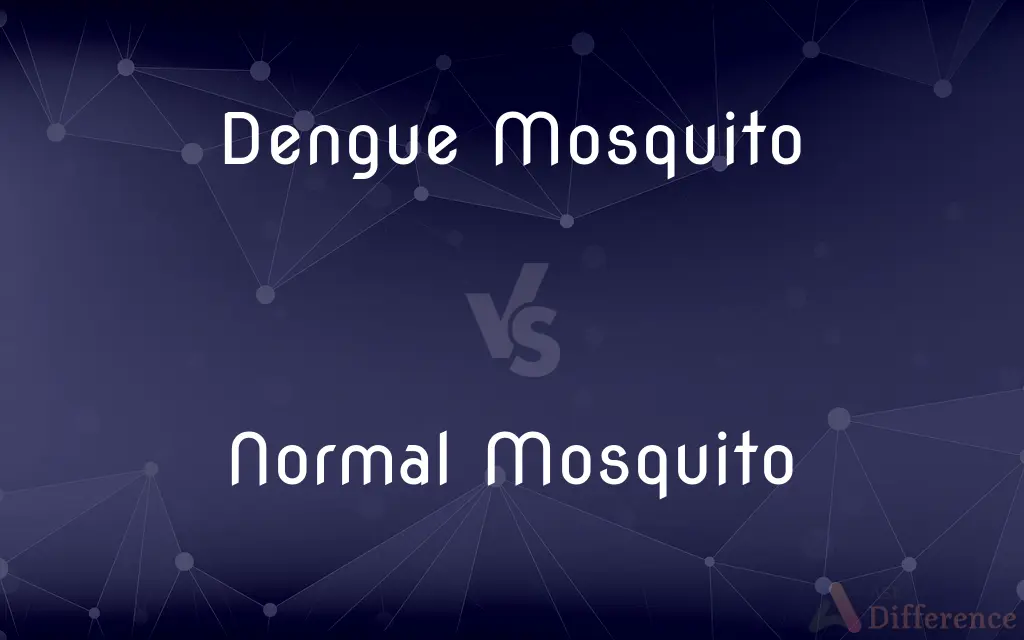Dengue Mosquito vs. Normal Mosquito — What's the Difference?
By Tayyaba Rehman — Published on January 5, 2024
Dengue Mosquito are Aedes mosquitoes, particularly Aedes aegypti and Aedes albopictus, capable of transmitting the dengue virus. Normal Mosquito are common mosquitoes that don't transmit specific diseases and are a nuisance for their biting behavior.

Difference Between Dengue Mosquito and Normal Mosquito
Table of Contents
ADVERTISEMENT
Key Differences
The term "Dengue Mosquito" refers to Aedes mosquitoes, primarily Aedes aegypti and Aedes albopictus. These mosquitoes are responsible for transmitting the dengue virus to humans. They are characterized by distinctive black and white stripes on their bodies and are known vectors for dengue fever, a potentially severe illness.
"Normal Mosquitoes," in contrast, encompass a wide range of mosquito species that are not associated with the transmission of specific diseases like dengue, Zika, or chikungunya. These mosquitoes are prevalent worldwide and are primarily a nuisance due to their irritating bites, which can cause itching and discomfort.
The key difference lies in their ability to transmit diseases. Dengue mosquitoes, specifically Aedes species, have adapted to carry and transmit the dengue virus. When they bite an infected person, they can subsequently infect others through their bites. Normal mosquitoes do not have this capacity for disease transmission and are mostly a seasonal annoyance.
Dengue mosquitoes, especially Aedes aegypti, are more prevalent in tropical and subtropical regions where dengue fever is endemic. They thrive in urban areas and are well-adapted to breeding in small water containers. In contrast, normal mosquitoes are found globally and inhabit various ecosystems, often depending on the species.
Dengue mosquitoes pose a significant public health threat, as they are responsible for outbreaks of dengue fever, which can lead to severe illness and even death in some cases. Efforts to control these mosquitoes are crucial in affected regions. Normal mosquitoes, while a local nuisance, do not carry the same level of public health risk.
ADVERTISEMENT
Comparison Chart
Disease
Transmit dengue virus
Typically do not transmit specific diseases
Biting Behavior
Responsible for dengue fever outbreaks
Primarily a nuisance due to itching from bites
Geographic Range
Prevalent in tropical and subtropical regions
Found globally in various ecosystems
Public Health
Significant public health concern
Localized annoyance with lower public health impact
Compare with Definitions
Dengue Mosquito
Dengue mosquitoes, like Aedes aegypti, can transmit the dengue virus.
Aedes aegypti, known as the dengue mosquito, is a vector for dengue fever.
Normal Mosquito
Unlike dengue mosquitoes, they do not pose significant public health risks.
Normal mosquitoes are a local nuisance but do not transmit diseases like dengue.
Dengue Mosquito
Dengue mosquitoes are a major public health concern in endemic regions.
Health authorities are working to control the dengue mosquito population.
Normal Mosquito
They are known for their irritating bites that cause itching.
Normal mosquitoes can leave itchy welts after biting.
Dengue Mosquito
Aedes mosquitoes have distinctive black and white stripes.
Identifying dengue mosquitoes by their stripes is crucial for control measures.
Normal Mosquito
These mosquitoes are found globally and vary by species.
The diversity of normal mosquito species depends on the region.
Dengue Mosquito
These mosquitoes are responsible for dengue fever outbreaks.
Dengue mosquitoes have caused several dengue outbreaks in the region.
Normal Mosquito
Normal mosquitoes are primarily a seasonal annoyance.
Residents use mosquito repellents to deter normal mosquitoes during summer.
Dengue Mosquito
They breed in small water containers, increasing their presence in urban areas.
Efforts to eliminate dengue mosquitoes involve removing potential breeding sites.
Normal Mosquito
Normal mosquitoes are common and do not transmit specific diseases.
Most mosquitoes encountered in everyday life are normal mosquitoes.
Common Curiosities
What is a Dengue Mosquito, and why is it significant?
Dengue mosquitoes, particularly Aedes species, transmit the dengue virus, causing dengue fever outbreaks with severe health implications.
What public health risks are associated with Dengue Mosquitoes?
Dengue mosquitoes pose a significant public health concern due to their role in dengue fever outbreaks, which can lead to severe illness and death.
Do Dengue Mosquitoes breed differently from normal mosquitoes?
Dengue mosquitoes, like Aedes species, often breed in small water containers, making urban areas susceptible to their presence.
How can I distinguish a Dengue Mosquito from a normal one?
Dengue mosquitoes, like Aedes aegypti, have distinctive black and white stripes on their bodies, while normal mosquitoes vary in appearance.
Can normal mosquitoes be a seasonal annoyance?
Yes, normal mosquitoes are often a seasonal nuisance, with increased activity during warm months.
Are there any vaccines against diseases transmitted by Dengue Mosquitoes?
There are vaccines available for dengue fever in some regions, but prevention through mosquito control remains crucial.
Where are Dengue Mosquitoes commonly found?
Dengue mosquitoes, especially Aedes aegypti, are prevalent in tropical and subtropical regions where they are responsible for dengue outbreaks.
Are normal mosquitoes a health concern?
Normal mosquitoes are primarily a local nuisance known for causing itching, but they do not carry the same level of public health risk as dengue mosquitoes.
Do normal mosquitoes transmit diseases like dengue?
No, normal mosquitoes typically do not transmit specific diseases like dengue. They are known for their irritating bites but do not carry such viruses.
What measures can be taken to control Dengue Mosquitoes?
Efforts to control dengue mosquitoes involve eliminating potential breeding sites and using insecticides in affected areas.
Are there variations in Dengue Mosquitoes' geographic range?
Dengue mosquitoes, especially Aedes aegypti, are more common in regions where dengue fever is endemic, but their range can vary.
What diseases, if any, are transmitted by normal mosquitoes?
Normal mosquitoes may transmit diseases such as West Nile virus or malaria, depending on the species and region, but not dengue.
What should I do if I suspect a Dengue Mosquito infestation in my area?
Contact local health authorities or vector control agencies to report the issue and seek guidance on control measures.
Are there different species of normal mosquitoes?
Yes, normal mosquitoes encompass various species that can vary in appearance and behavior depending on the region.
How can I protect myself from Dengue Mosquitoes?
Protective measures include using mosquito nets, repellents, and wearing protective clothing, especially in dengue-prone areas.
Share Your Discovery

Previous Comparison
Glycolysis vs. Krebs Cycle
Next Comparison
1H NMR vs. 13C NMRAuthor Spotlight
Written by
Tayyaba RehmanTayyaba Rehman is a distinguished writer, currently serving as a primary contributor to askdifference.com. As a researcher in semantics and etymology, Tayyaba's passion for the complexity of languages and their distinctions has found a perfect home on the platform. Tayyaba delves into the intricacies of language, distinguishing between commonly confused words and phrases, thereby providing clarity for readers worldwide.














































